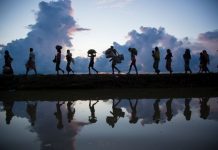This article is written by Raslin Saluja from KIIT School of Law, Bhubaneswar. This article analyses the impact and the after-effects of an unprecedented decision taken in these trying times of COVID-19.
Table of Contents
Introduction
By now, people are well aware of the far-reaching disruptive effects coronavirus has had not only on those who got infected by it but also on the other stakeholders of society. The unprecedented virus brought the country to impose some extreme measures in order to control its spread which included nationwide lockdowns, closure of various industries, travel restrictions, and social distancing protocols. With stay-at-home instructions and complete shutdown, sectors such as oil and gas, aviation, agriculture, automobiles, retails and the like had to face the wrath of it.
Similarly, the virus has equally been unkind to the education system of India. It compelled many educational institutions to cancel the classes, postpone the exams and internships. This also led to delayed admissions processes and moreover, students had to bear the loss of 3 months of their precious time of the academic year. The delay in exams and the time lost can later affect the employment opportunities for the students. Initially, what had started as temporary solutions seem to have turned into long-term measures.
COVID-19 and its Impact on school-going children
The first measure that was taken by the respective state government was to temporarily shut down all schools, colleges, and universities to combat the spread and avoid student gathering. As time went by, there loomed an uncertainty as to the reopening of institutions. Permanently pausing the educational system for a while could go on to have far-reaching consequences impacting the economic and societal aspects of the society. It was estimated that the lockdown affected approximately 600 million students worldwide and this is only about the school-going students.
The respective academic institutions have kept up with the pace and resume the studies through online mode with the help of video conferencing platforms like Zoom, Google Meet, Whatsapp, etc. The teachers as well as the students both took their time to adjust to this new mode of learning. The government advised postponing the midterm exams, and shorten the syllabus. Further, the institutions had to devise new modes for conducting exams, internal assignments, marking criteria, carrying out extracurricular activities, and other interesting methods to make the sessions more interactive, considering the convenience of both students as well as the faculties.
The rich and the poor
However, such an option could only serve the privileged class of society as to attend an online class, typically, one needs a gadget like a smartphone, laptop, or computer and stable internet service be it through wireless application protocol or a cellular service provider. Unfortunately, this opportunity was missed by many students hailing from rural areas and mainly from the economically backward section of the society studying in local or government schools.
For instance, an article reported about 16 lakh children from poor households who had faced disruptions because of no access to such gadgets and the digital gap. While many families did not have such gadgets, others did not know how to make use of them. A certain few could not spare their phones for performing essential services and duty work. As for municipal schools, they faced problems at their end due to a lack of computers or even any database to connect with students and their parents. In others, some teachers were not aware of Whatsapp and were not trained on how to conduct online classes. The bare minimum also seemed out of question with children with special needs and disabilities due to lack of resources and the compounding digital gap. While many students belonging to primary and middle schools struggled with online classes and virtual assignments on technical subjects like mathematics.
While the more fortunate ones, who did attend their classes online, faced their own struggles. Some of them are mentioned herein:
- Adapting to the new normal environment as the parents and their children work and study together at home.
- Adhering to this new discipline and learning the norms of education in a virtual setting.
- The absence of social interaction and monotonous learning can have huge impacts on the personality building of children.
- There were also many virtual distractions that reduced the concentration of students as they could access other online websites at the same time.
- The increased screen time resulted in eye strain, bad posture, headaches.
The decision of examination authorities amidst pandemic
As for the year 2020, the Central Government had directed to reduce the syllabus eliminating the repetitive portions in the various chapters for the upcoming board examination for the students of classes 10 and 12. For example, a topic known as ‘Reaction of Metal with Acids and Salts’ is covered in two chapters, one about ‘Acids, Bases and Salts’ and another called ‘Metals and Non-metals’ in the Class 10 science book.
Thus, such chapters and topics were subject to rationalization. The students appearing for the board were specifically given priority in the syllabus rationalization due to the significance of the exam in guiding future academic courses. Nevertheless, diligent attempts were made to not compromise the core and essence of the chapters. It was an initiative of the Ministry of Human Resource followed by the National Council for Educational Research and Training (NCERT) and the Central Board of Secondary Education (CBSE).
Postponement
Because of the increasing number of cases and the imposition of the lockdown, the CBSE and Council for the Indian School Certificate Examinations (CISCE) along with various other regional/state boards decided to postpone the remaining examinations. CBSE postponed all the pending board examinations that were to be held between March 19 to March 31, 2020. CBSE Board had also cancelled class 10th and 12th board exams for students located outside India.
The notification also mentioned that these will get rescheduled as and when the situation eases and all the involved stakeholders will be informed of the new schedule before 10 days of starting the exams. Further, it was informed on April 1, that the Board will conduct examinations of only 29 subjects which are considered crucial for higher academic studies. So far students of grades 1 to 9, and 11 are concerned, they were already directed to get promoted to the next standard.
After extensive consideration, the CBSE had decided to conduct the exams from July 1 to July 15, 2020 however as fate would have it, the Supreme Court issued orders to CBSE to cancel the remaining exams scheduled for the month of July, as the pandemic continued to persist.
Results
The board then went on to evaluate the students’ scores by calculating the average of best three previous exams for students who appeared for four papers, of two best papers for those who had written three papers, and the internal assessments for those who appeared for two or fewer papers, and notified to declare the results of both 10th and 12th standard by July 15. The marks as decided by the Board were to be final and conclusive for class 10th students, however, for class 12 students, an option to appear for remaining subjects when the situation comes under control was given. CISCE was quick to follow the trend, however, it did not provide the reappearing option for 12th class students and hence concluded that no further exams will be conducted.
History repeats
As India slowly tried to get things back to normal and lifted the restrictions partially, schools and colleges were permitted to call the students on campus and conduct classes. However, the discretion remained at the respective institution’s hands. To that extent, a lot of schools reopened and normalcy seemed to be restored. But, by March 2021, cases were again on a hike, only this time even more ghastly and we were back to square one into another lockdown. Board exams for class 10th had to be cancelled again, and as for class 12th exams which were scheduled to start on May 4th, 2021, and be continued till June 14th, stands postponed.
CBSE has informed that final decisions will be taken after conducting a thorough review of the situation of the country on 1st June 2021, however, there are apprehensions for the postponement of these exams till July. One of the CBSE’s officials even stated that if exams could not be conducted in July, they will consider cancelling them as well since the whole process of conduction, evaluation, and result declaration takes more than a month’s time to complete. Further, future admissions also depend on it.
As for evaluation, it was recently informed that 20 marks will be allotted to internal assessment and 80 marks for the year-end board exams. The assessment of 80 marks for Board exams 2021, will be in the following ways:
- Based on the marks scored by the candidate in different tests/exams conducted by the school in the course of the year.
- The marks should be in consonance with the past performance of the school in CBSE Class 10 Board exams.
A friendly move
The board decided against releasing a “merit list” of toppers, and also said the term “fail” would not be used in any student’s documents or on the results released on the website. Instead, the students who could not pass were marked as “Essential Repeat” candidates. Later in September 2020, the examinations were held online. Besides this, optional “improvement exams” for Class XII students who wished to improve the scores that they received on the basis of the board’s revised marking scheme were also held. Over 9,000 students opted for these improvement exams.
As for now, in 2021, a new rule has been introduced by CBSE keeping in mind the government’s Skill India initiative. Those students who fail in any one of the three elective subjects namely Science, Mathematics and Social Science, for them the failed subject will be replaced by the ‘Skill Subject (offered as a 6th additional subject). Pursuant to that the class 10 board exam percentage will be calculated on the best of five subjects. This decision by CBSE is welcomed by students, parents, and teachers alike.
Considering the current COVID-19 situation, that seems, even more, worse in the present times due to a lack of essential resources and improper management. Cancelling and postponing exams sure does help as many family members of the students and the students themselves are getting affected by the virus, however, there is no doubt that these exams hold significance for students in making future academic decisions and even the colleges and university admissions rely upon these results. Many experts from various institutions have welcomed the move and have come forward to extend their support to the student community.
The whole conversation about mental health
Prevalent epidemics are known to accentuate or generate new stressors, including depression, panic, anxiety, and concern for oneself or loved ones. Further, quarantine and isolation restrictions that led to physical immobility and restrained social activity cause abrupt and drastic changes in lifestyle. Many considerations, such as16:53:25 that were influenced by the COVID-19 pandemic could also lead to depressed thoughts and suicidal ideation, as well as feelings of loneliness, hopelessness, as well as financial and academic uncertainties. A very articulative survey done by Active Minds on the impact of COVID-19 on student mental health has given disturbing results reflecting the deteriorating state of mental well-being. Among the various issues that students are facing, these include:
- Having trouble concentrating on studies,
- Experiencing feelings of unhappiness in the living space,
- Limited access to mental health services,
- Some have trouble meeting their basic needs,
- Many are unable to cope with the pandemic,
- Mood swings reduced productivity, and disturbed sleeping patterns, and
- For some, even their homes are no safe haven with a toxic environment of abuse.
According to another study, 82% of students expressed that most of the health and behavioural issues that were faced during the pandemic were due to academic loss. The stigma associated with COVID-19 and the fear of being exposed to COVID-19 were also a leading reason for stress among the students. While issues for the underprivileged are even more than these, for those living in unhealthy conditions and one-room houses, having online classes for them could be a nightmare.
Even the news of the cancellation of exams has brought about mixed reactions from the student community. While some hail this decision, several others are worried about the need for some alternative form of assessment. It also raises questions about the mode of calculation and whether or not marks of previous assessments are adequate to let them enrol in a pre-university college of their choice. Some who were preparing in the hope to score well in the board exams also believe that they are at a disadvantage for not performing well in their pre-boards. It has also caused a lot of distress for people who felt that the extremely hard work, sacrifices, and efforts they put in over the academic session became worthless.
What can be done
The students need to realize that their hard work is not wasted as the knowledge they have gained is invaluable, regardless of the marks – the grades do not define their potential. On the other hand, it is an indisputable fact that there is an acute shortage of mental health professionals in India and the consequences are far more serious than what we can imagine. The study also states that every 1 in 7 persons is unaware of the available measures for handling this situation. Having a stigma attached to mental health does not help the situation either. Most people fear opening up and freely discussing mental health issues, and 81% of students agreed to the fact.
It is high time for the government to take initiative and provide some guidelines on how to tackle mental wellbeing and sensitize the children about this issue. To that end, CBSE has released a mental health and wellness manual on its official website with an attempt to align the role and importance of parents, schools, teachers, counselors, and special educators as immediate caregivers at different developmental phases of students. Furthermore, the manual also attempts to highlight ways in which one can deal with this COVID-19 situation.
Children and their guardians need to be made comfortable around the subject of mental health issues and treat them the same as any other physical health issue that needs to be addressed without delay. We should encourage them to be vocal about it and discuss it with their family or friends or the person who is close to them. This will help them tackle such situations and keep them away from slipping into depression and harming themselves.
Conclusion
A halt in the classroom learning routines, cancellation of exams, and opting for online learning seems to have paved a new way to hold on to normalcy for students and teachers. However, the clouds of uncertainty continue to hover around the students, which sure have taken a toll on their mental health. With constant cooperation and understanding in the exercise of mental health initiatives, the situation is expected to improve. After all their wellbeing is always the most important thing to take care of, particularly at times like this.
References
- https://theprint.in/india/education/no-gadgets-no-studies-what-online-classes-mean-for-16-lakh-poor-students-in-delhi-schools/406837/
- https://www.zeebiz.com/education/news-cbse-class-12-board-exam-2021-latest-news-update-to-be-postponed-till-july-156377
- https://www.hindustantimes.com/india-news/order-on-mandatory-centre-visits-revoked/story-IxcO903m3xixVgcy6duEoN.html
- https://www.jagranjosh.com/general-knowledge/impact-of-coronavirus-on-education-in-india-1587642880-1
- https://www.researchgate.net/publication/342123463_Impact_of_Pandemic_COVID-19_on_Education_in_India
LawSikho has created a telegram group for exchanging legal knowledge, referrals, and various opportunities. You can click on this link and join:
 Serato DJ Crack 2025Serato DJ PRO Crack
Serato DJ Crack 2025Serato DJ PRO Crack











 Allow notifications
Allow notifications


